As a BetterHelp affiliate, we receive compensation from BetterHelp if you purchase products or services through the links provided
Anxiety can feel like an unwelcome shadow, following us through our daily lives and hindering our ability to enjoy moments to their fullest. With that said, there’s a beacon of hope for those seeking to break free from the clutches of anxiety.
This article delves into practical, long-term strategies that foster mental resilience and promote sustained well-being.
By understanding the roots of anxiety and employing these carefully curated techniques, readers will learn how to navigate their emotional landscapes more effectively, paving the way for a calmer, more fulfilling life free from the constraints of anxiety.
What is Anxiety?
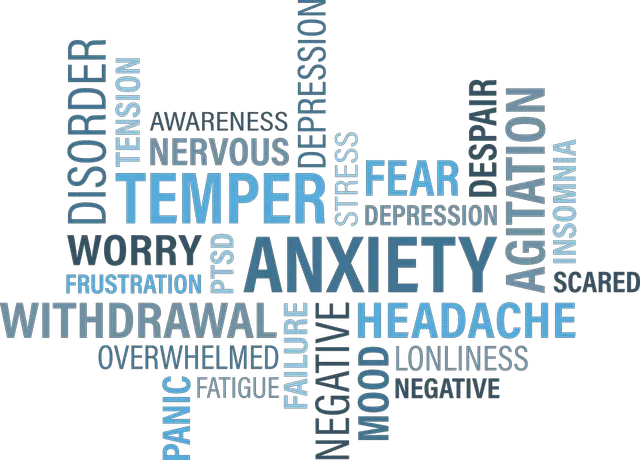 Anxiety is a common mental health condition marked by feelings of worry, nervousness, or fear that are strong enough to interfere with one’s daily activities. It often involves stress about future events and concerns about the present, leading to physical responses like rapid heartbeat and sweating.
Anxiety is a common mental health condition marked by feelings of worry, nervousness, or fear that are strong enough to interfere with one’s daily activities. It often involves stress about future events and concerns about the present, leading to physical responses like rapid heartbeat and sweating.
Even though everyone experiences anxiety at some point in life, it becomes an issue when these sensations are overwhelming and persistent, affecting how we live.
In more severe forms, such as Generalized Anxiety Disorder (GAD), individuals find themselves in a constant state of worry over everyday issues that seem uncontrollable. This chronic worrying can have adverse effects on both mental and physical health; hence, managing anxiety effectively is critical.
Without proper coping strategies or therapy, long-standing anxiety may pave the way for further medical problems, including heart disease or depression.
The Negative Effects of Anxiety
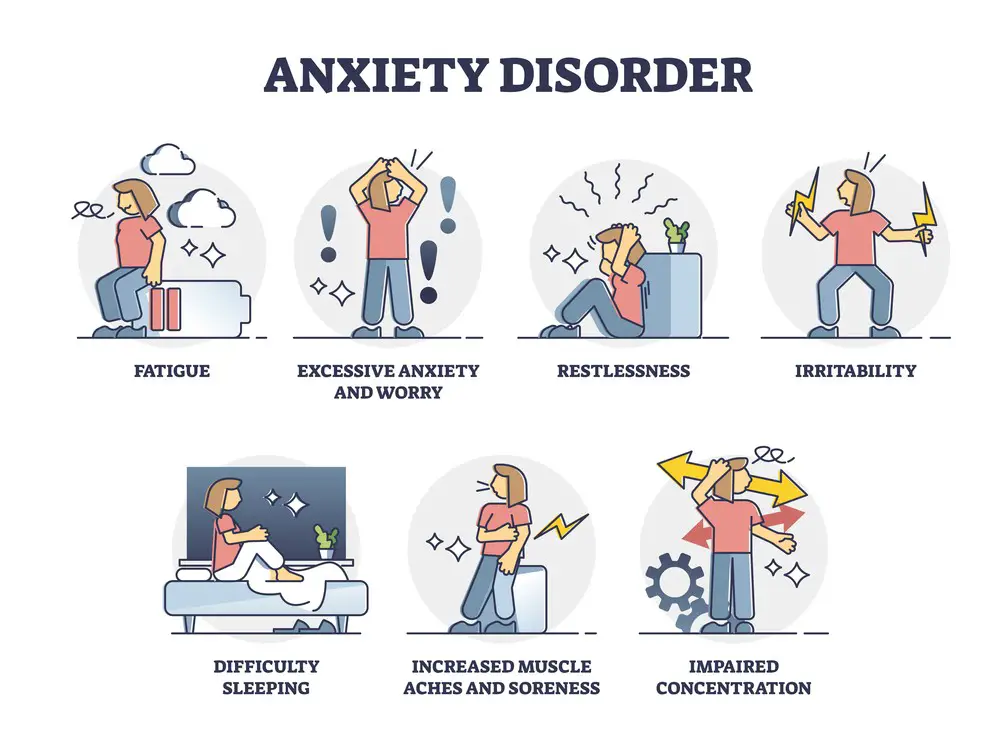 Anxiety is a common mental health issue that can have significant negative impacts if left unchecked. Anxiety manifests itself in various forms, including excessive worrying, restlessness, fatigue, irritability, muscle tension, and difficulty concentrating.
Anxiety is a common mental health issue that can have significant negative impacts if left unchecked. Anxiety manifests itself in various forms, including excessive worrying, restlessness, fatigue, irritability, muscle tension, and difficulty concentrating.
The most apparent negative effect of anxiety is the mental strain it puts on sufferers. The constant worry, panic, and unease make it extremely difficult to function typically daily. Simple tasks become much harder, and quality of life greatly diminishes. Anxiety also takes a toll physically – headaches, stomach issues, rapid heart rate, and insomnia are widespread.
In the long run, anxiety increases one’s risk for other medical conditions like heart disease, diabetes, and stroke. Chronic stress anxiety applies to the body and can alter critical processes like immune function, brain chemistry, hormones, and digestion. This wear and tear makes the body more susceptible to illness and disease later on.
Socially, those with anxiety tend to isolate themselves due to irrational fears or self-consciousness. They may turn down opportunities or invitations, stunting personal growth, relationships, and career advancement. Confidence also suffers significantly in individuals with anxiety.
Overall, anxiety disorders have the potential to negatively impact all aspects of a person’s life, from mental and physical health to social and professional endeavors. Seeking treatment is crucial for managing anxiety before it leads to worse outcomes.
Natural Anxiety Remedies
Exercise plays a critical role in managing anxiety. Regular physical activity releases endorphins, chemicals in your brain that act as natural painkillers and mood lifters. Daily short walks or yoga sessions can significantly decrease anxiety and increase energy levels.
Alongside exercise, relaxation techniques such as deep-breathing exercises, meditation, or even spending quiet time outdoors offer peaceful moments to reset the mind and lower stress.
Herbal remedies also offer gentle help without reliance on pharmaceuticals. Chamomile tea is widely recognized for its calming effects on the nervous system and can serve as a warm, comforting beverage during high stress.
Lavender oil’s soothing scent has been used in aromatherapy to reduce worry and improve sleep quality. Supplements like omega-3 fatty acids may contribute to overall mental health by helping regulate neurotransmitters associated with anxiety, while magnesium is known for aiding the relaxation of muscles and nerves.
Practical Steps For Anxiety Relief
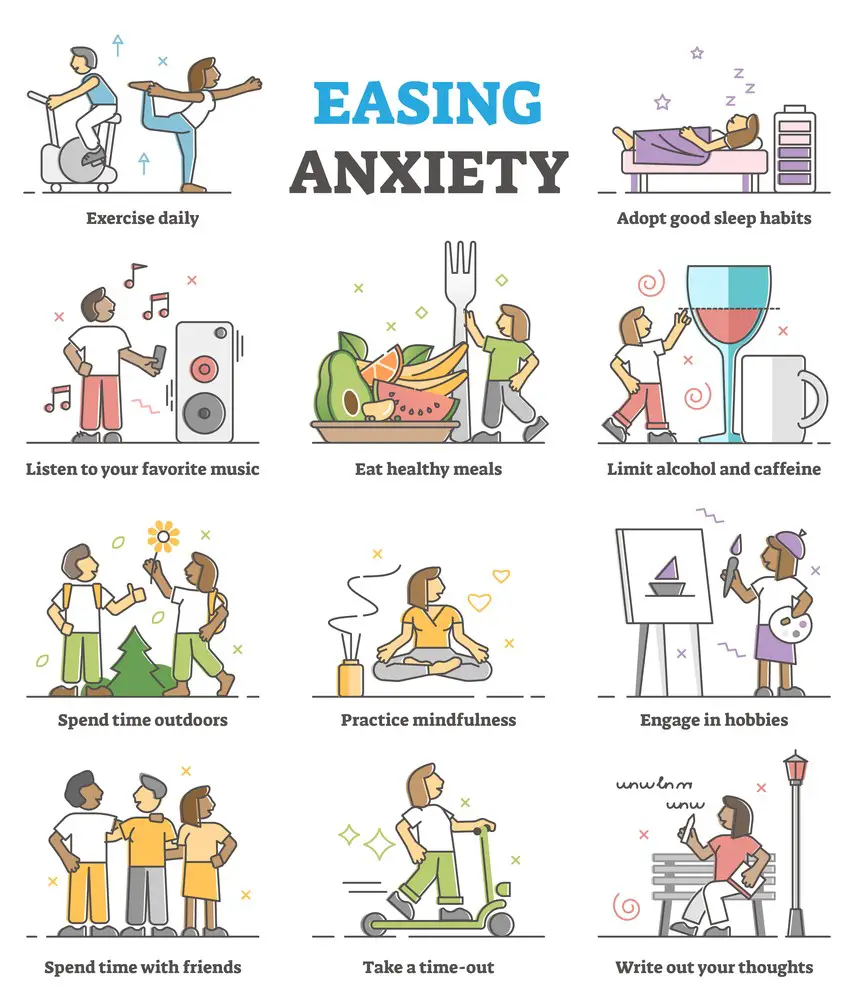 Incorporate daily actions that nurture your physical and mental health to create a solid foundation for anxiety relief. These practical steps can be seamlessly integrated into your routine, empowering you to manage stressors with confidence and calm.
Incorporate daily actions that nurture your physical and mental health to create a solid foundation for anxiety relief. These practical steps can be seamlessly integrated into your routine, empowering you to manage stressors with confidence and calm.
Practicing Self-care
 Taking time for self-care is like giving a well-deserved gift to your body and mind, helping to keep anxiety at bay. Start with simple steps: carve out a few minutes daily to engage in activities that bring you joy or relaxation.
Taking time for self-care is like giving a well-deserved gift to your body and mind, helping to keep anxiety at bay. Start with simple steps: carve out a few minutes daily to engage in activities that bring you joy or relaxation.
This might mean diving into a good book, taking a brisk walk in nature, or enjoying a hobby that calms your heart rate and clears your mind.
Embrace healthy habits as cornerstones of your self-care routine. Exercise regularly; even light physical activity can release endorphins, improving mood and decreasing stress levels.
Make mindfulness exercises part of your daily life—deep breathing, meditation, or yoga are powerful tools for maintaining emotional well-being. Practicing positive thinking and jotting down uplifting thoughts each day strengthens mental health muscles just as surely as lifting weights builds physical strength.
Let music fill the air around you or soak in the warmth of a bath—these relaxation methods are pleasant and practical techniques for anxiety relief.
Limiting Caffeine and Alcohol Intake
Cutting back on stimulants like caffeine and alcohol could be a game-changer for easing anxiety. Caffeine, often found in coffee, tea, and energy drinks, can heighten stress and contribute to feelings of nervousness.
If you notice your heart racing or hands trembling after a cup of joe, it may be time to switch to decaffeinated alternatives or soothing herbal teas that don’t trigger anxiety.
Alcohol reduction is another critical step towards calmness. While some believe that a glass of wine helps them relax, alcohol disrupts sleep patterns and mood stability over time.
To manage anxiety more effectively, consider sipping sparkling water with lemon at social events instead. This simple lifestyle adjustment not only aids in staying hydrated but also keeps your mind clear from the fog that alcohol might cast over your emotions.
These dietary changes can pave the way for steadier nerves and improved overall well-being without relying on medications.
Prioritizing Sleep
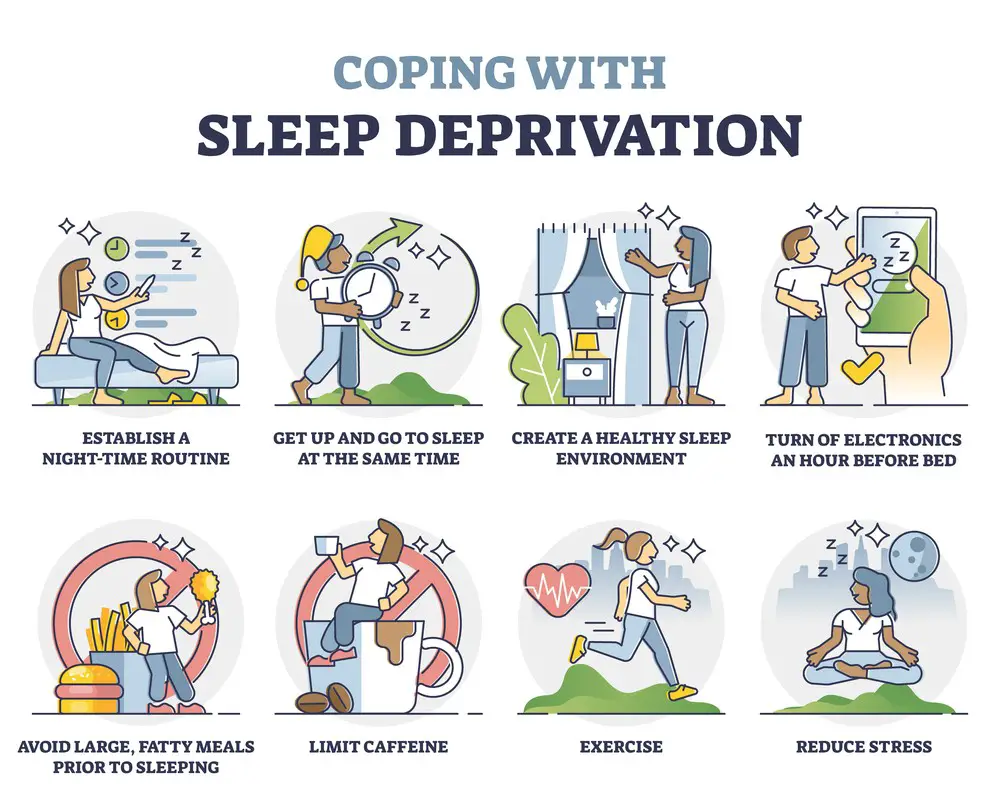 Creating a calming evening routine complements efforts to reduce caffeine and alcohol consumption. Prioritizing sleep lays the groundwork for better emotional wellness, as restful slumber is vital in managing anxiety.
Creating a calming evening routine complements efforts to reduce caffeine and alcohol consumption. Prioritizing sleep lays the groundwork for better emotional wellness, as restful slumber is vital in managing anxiety.
Establish a consistent sleep schedule and make your bedroom an oasis for relaxation. Keep gadgets out of reach and dim the lights to signal your body that it’s time to unwind.
Focus on developing healthy sleep hygiene habits like mindful breathing or reading before bed instead of screen time. These actions reinforce your natural sleep-wake cycle, leading to deeper, more restorative sleep.
Remember, adequate rest goes beyond mere stress reduction; it fundamentally strengthens mental health and equips you with resilience against anxiety’s challenging waves.
Long-Term Strategies For Overcoming Anxiety
Developing a solid understanding of what triggers your anxiety is a crucial long-term strategy. It empowers you to anticipate challenging situations and prepare coping mechanisms that work for you.
Keep a journal to spot patterns in your daily life that might be contributing factors. This will help you create targeted strategies, such as stress management techniques or gradual exposure therapy, tailored specifically to address and reduce these triggers.
Incorporating mindfulness meditation into your daily routine can also serve as an effective long-term solution for anxiety control. Dedicate daily time to focus on deep breathing exercises that calm the mind and body, fostering tranquility and resilience against stressors.
Similarly, relaxation exercises before bedtime can improve sleep quality—a key component in maintaining mental health balance. After mastering these methods, progress toward building healthy eating habits that support overall well-being and fortify the body’s defense against anxiety.
Breaking Free From Anxiety’s Grip
Anxiety often feels like it has us in a chokehold, but breaking free is possible. Start by acknowledging your feelings of stress, panic, and worry without judgment. Taking this step opens the door to understanding your triggers and reframing how you react to anxiety-inducing situations.
Recognize that overcoming fear begins with acceptance—acknowledging that you’re anxious doesn’t mean surrender; it’s the first move toward empowerment.
Building resilience against overwhelming thoughts means actively engaging in relaxation techniques such as deep breathing exercises or mindfulness meditation. Create a toolbox filled with these coping skills to dismantle nervousness whenever it rears its head.
Exercise also plays a crucial role in loosening the grip of anxiety. Regular physical activity releases endorphins, which are natural mood lifters, helping to alleviate symptoms of depression and elevate your overall sense of well-being.
Sustainable Solutions For Anxiety
Incorporate mindfulness into your daily routine to gain a sense of control over spiraling thoughts. Mindfulness helps you stay present and significantly reduces anxiety through focused attention and breathing techniques.
Regular practice reinforces a calm mind, making it easier to manage worries when they arise.
Adopt relaxation techniques such as progressive muscle relaxation or guided imagery to create a personal sanctuary from stress. These methods promote physical and mental tranquility, enabling the body to release tension and encouraging a peaceful state of being.
Engage in these practices consistently for compounded benefits that contribute to long-lasting anxiety relief.
Conquering Anxiety For Good
Conquering anxiety for good requires a commitment to long-term wellness practices and often professional guidance. Cognitive behavioral therapy is a powerful technique that reshapes thought patterns and equips individuals with coping skills to handle stressful situations better.
Mindfulness and meditation can also play significant roles; they help calm the mind, improve focus, and reduce the frequency of panic attacks.
Developing a routine that includes regular exercise is crucial because physical activity releases endorphins, chemicals in your brain that act as natural painkillers and mood lifters.
In addition to fitness habits, integrating relaxation techniques like deep breathing into daily life can provide immediate relief from high stress or anxiety. Making these strategies part of everyday living ensures a stronger foundation for mental health and the ability to manage anxiety effectively over time.
Effective Anxiety Management Techniques
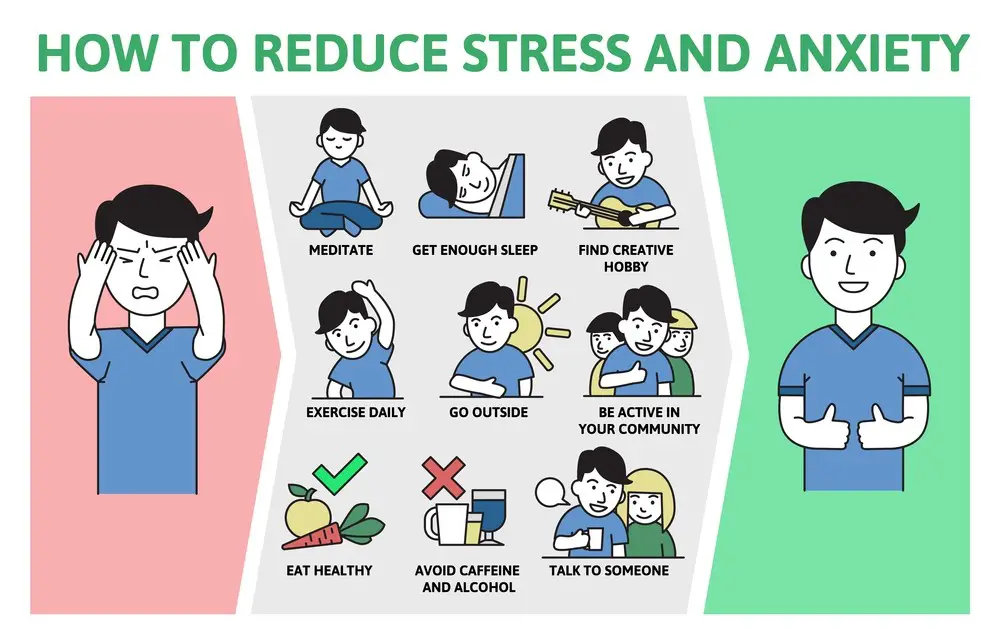 Mastering your breathing can serve as a powerful tool in managing anxiety. Regular practice of deep, slow breaths helps to calm the nervous system and reduce stress levels. Engage in activities like yoga or simple breathing exercises to enhance control over your respiration and promote relaxation.
Mastering your breathing can serve as a powerful tool in managing anxiety. Regular practice of deep, slow breaths helps to calm the nervous system and reduce stress levels. Engage in activities like yoga or simple breathing exercises to enhance control over your respiration and promote relaxation.
Embrace mindfulness practices to anchor yourself in the present moment, which can minimize worry about past troubles or future uncertainties. Techniques such as meditation help shift focus away from anxiety-inducing thoughts and bring a sense of peace.
Incorporate short sessions into your daily routine for long-lasting benefits.
Fine-tune your diet with changes that support mental health; omega-3-rich foods like salmon and walnuts have been linked to reduced anxiety symptoms. Also, consider reducing stimulants like caffeine, which can exacerbate feelings of jitteriness and unrest.
Exploring various therapy options offers structured support for dealing with anxiety. Cognitive-behavioral therapy (CBT), in particular, equips individuals with strategies to challenge negative thought patterns that fuel anxiety, helping them adopt healthier perspectives.
Lastly, carving out time for self-care is essential; it’s not just about bubble baths but also ensuring you get enough sleep, stay hydrated, exercise regularly, and engage in hobbies that bring you joy – all formative steps towards maintaining an anxious-free life.
Permanently Reducing Anxiety Levels
Moving beyond managing anxiety, some changes can lead to long-lasting relief. Daily mindfulness meditation can drastically lower stress and may rival traditional medication in effectiveness for some individuals.
Regular physical exercise boosts endorphin levels, promoting a sense of well-being and providing a natural counterbalance to the discomforts of anxiety.
Healthy dietary habits also play a significant role; eating nutrient-rich foods stabilizes mood and energy, making it easier to handle stressful situations. Focusing on achieving adequate sleep each night also aids in maintaining emotional balance, which is crucial for keeping anxiety at bay over the long term.
With consistent practice, these lifestyle adjustments forge pathways toward enduring calmness and control over anxiety without constantly relying on short-term techniques or interventions.
Elevate Your Peace: Advanced Tools for Anxiety Mastery
 Unlock a new level of tranquility and control over your anxiety with these advanced yet simple strategies. Designed to be practical and powerful, each tip offers a stepping stone towards a calmer, more resilient you. Let’s dive in:
Unlock a new level of tranquility and control over your anxiety with these advanced yet simple strategies. Designed to be practical and powerful, each tip offers a stepping stone towards a calmer, more resilient you. Let’s dive in:
- Harness the Power of Adaptogens: Dive into the world of adaptogens like ashwagandha and rhodiola. These natural herbs are fascinating and can help balance your body’s response to stress. A small step towards understanding your body’s needs can lead to big leaps in managing anxiety.
- Cultivate Gut Harmony: Ever thought your gut could influence your mood? Embark on a journey to improve your gut health with probiotics and fiber-rich foods. This path nourishes your body and might also soothe your anxious mind.
- Embrace a Digital Detox: Challenge yourself to a digital detox. Reducing screen time, especially from social media, can significantly lower anxiety levels, giving you more time to connect with yourself and the world around you.
- Unleash Your Creative Spirit: Pick up a brush, a pen, or an instrument – creativity is a powerful outlet for emotions and a proven stress reliever. Engaging in creative activities can be a joyful exploration of your inner world, offering relief and a sense of accomplishment.
- Deepen Mindfulness Practices: Go beyond traditional meditation by integrating mindfulness into daily routines. This practice can transform mundane tasks into moments of peace and presence, gradually reducing anxiety.
- Explore Emotional Freedom Technique (EFT): EFT, or tapping, is a technique that combines ancient Chinese acupressure and modern psychology. Learning and practicing EFT can offer immediate relief in anxious moments, empowering you with a tool you can use anytime, anywhere.
- Seek Connection: Building solid and supportive relationships can provide a buffer against anxiety. Whether it’s joining a support group, connecting with loved ones, or finding community in hobbies, the power of connection should never be underestimated.
Your Journey to Serenity
Remember, overcoming anxiety is a journey, not a race. Each step you take, no matter how small, is a victory. Embrace these strategies as techniques to reduce anxiety and as keys to unlocking a more peaceful, fulfilling life.
Navigating the Crossroads: Choosing Between Therapy and Medication for Anxiety
 When the waves of anxiety seem relentless, knowing when to seek professional help can be your beacon of hope. But the decision between pursuing therapy, medication, or a combination of both can feel overwhelming. Here’s a guide to help illuminate that path.
When the waves of anxiety seem relentless, knowing when to seek professional help can be your beacon of hope. But the decision between pursuing therapy, medication, or a combination of both can feel overwhelming. Here’s a guide to help illuminate that path.
Recognizing the Signs for Professional Help
Firstly, it’s crucial to understand when anxiety has crossed the line from everyday stress to a condition that interferes with your daily life. If you find anxiety dictating your decisions, disrupting your sleep, or isolating you from your loved ones, it’s time to consider professional help.
Therapy: The Path to Understanding and Coping
Therapy, especially cognitive-behavioral therapy (CBT), is often the first recommended step for managing anxiety. It’s particularly beneficial if:
- You’re seeking to understand the root causes of your anxiety.
- You want to learn coping mechanisms and strategies to manage anxiety.
- Your anxiety is linked to past traumas or deep-seated behavioral patterns. Therapy offers a safe space to explore your feelings, thoughts, and behaviors, equipping you with tools to navigate anxiety more effectively.
Medication: When Chemical Support is Needed
Medication might be a more suitable option in the following scenarios:
- Your anxiety is severe, significantly impacting your ability to function daily.
- You’ve tried therapy, and while it’s been helpful, you still find your symptoms overwhelming.
- There’s a biological component to your anxiety, where chemical imbalances play a significant role, making medication a necessary support.
- Stress Management: What is the Relationship Between Stress and Addiction? - June 28, 2024
- Exploring Techniques to Maintain a Healthy Lifestyle without Drugs - May 28, 2024
- How Acupuncture Helps Treat Chronic Fatigue Syndrome - May 28, 2024
This site contains affiliate links to products. We will receive a commission for purchases made through these links.




